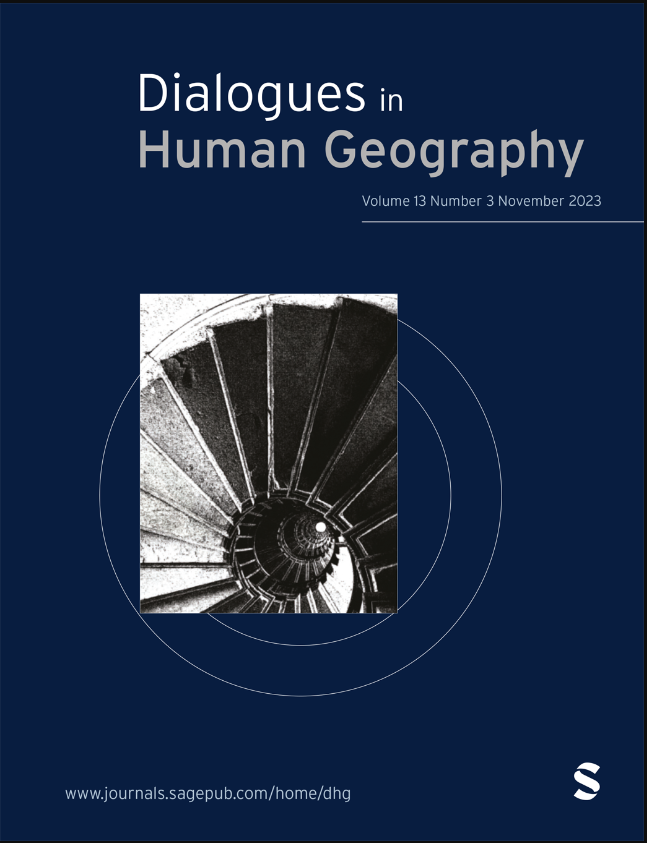人文地理学的形式、体裁、声音和权威:一种思辨的谱系
IF 9.6
1区 社会学
Q1 GEOGRAPHY
引用次数: 0
摘要
《2020-2043年地理学术书面形式趋势的推测谱系》探讨了该学科的戏剧性转变,这种转变伴随着“新形式主义”转向对地理写作的形式方面的批判性反思和实验,包括结构、体例、声音和风格。20世纪20年代初,英语研究期刊上的学术地理写作形式、体裁和风格在形式上仍然相当同质化。关于形式的实验大多局限于子学科的竖井。在一系列重要的学术干预之后,这门学科开始更认真地反思通过使用特定的书面形式和作者角色所声称的不同类型的权威。然而,在21世纪最初的几十年里,作者角色大多是自信的、自信的、果断的,并表达了对概念的“掌握”,转向对地理书面形式进行更大的批判性分析,导致了作者角色的激增,通常拒绝与“掌握”相关的角色,而是探索犹豫、焦虑、犹豫不决、被动、即兴、不可靠、多元化、失败、幽默和自我贬低。作为主张不同的,更平等的知识权威形式的方式。这一谱系得出的结论是,尽管折衷主义存在问题,但从20世纪20年代中期到今天,这种对地理学书面形式进行更大方法论反思的转变极大地丰富了这门学科。本文章由计算机程序翻译,如有差异,请以英文原文为准。
Form, genre, voice, and authority in human geography: A speculative genealogy
This speculative genealogy of trends in the written forms of geographical scholarship, 2020–2043, explores the dramatic transformations in the discipline that came with a ‘neo-formalist’ turn towards critical reflection on and experiment with the formal aspects of geographical writing, including structure, genre, voice, and style. At the start of the 2020s, the forms, genres, and styles of academic geographical writing in Anglophone research journals were still rather homogeneous in form. Experiments with form were mostly restricted to sub-disciplinary silos. Following a series of important scholarly interventions, the discipline started to reflect more earnestly on the different kinds of authority that are claimed through the use of particular written forms and authorial personas. Whereas in the early decades of the 21st century, authorial personas were mostly confident, self-assured, decisive, and expressing a ‘mastery’ of concepts, the turn towards greater critical analysis of geography's written forms led to a proliferation of authorial personas, often rejecting personas associated with ‘mastery’ and instead exploring hesitation, anxiety, indecision, passivity, improvisation, unreliability, plurality, failure, humour, and self-deprecation, as ways of claiming different, more egalitarian forms of epistemic authority. This genealogy concludes that despite the problem of eclecticism, this turn towards greater methodological reflection on geography's written forms has greatly enriched the discipline from the mid-2020s until today.
求助全文
通过发布文献求助,成功后即可免费获取论文全文。
去求助
来源期刊

Dialogues in Human Geography
GEOGRAPHY-
CiteScore
8.00
自引率
4.00%
发文量
86
期刊介绍:
Dialogues in Human Geography aims to foster open and critical debate on the philosophical, methodological, and pedagogical underpinnings of geographic thought and practice. The journal publishes articles, accompanied by responses, that critique current thinking and practice while charting future directions for geographic thought, empirical research, and pedagogy. Dialogues is theoretically oriented, forward-looking, and seeks to publish original and innovative work that expands the boundaries of geographical theory, practice, and pedagogy through a unique format of open peer commentary. This format encourages engaged dialogue. The journal's scope encompasses the broader agenda of human geography within the context of social sciences, humanities, and environmental sciences, as well as specific ideas, debates, and practices within disciplinary subfields. It is relevant and useful to those interested in all aspects of the discipline.
 求助内容:
求助内容: 应助结果提醒方式:
应助结果提醒方式:


